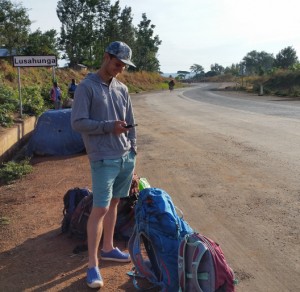Notes from the Road: Waiting in Africa
 You can’t read a book about Africa or listen to a first-hand account without hearing about waiting and delays. Some people are disgusted by the delays they have to deal with in Africa – what an insult to be kept waiting! Others view the “pole pole” pace as charming side effect of “underdevelopment” – a cultural oddity they can observe on vacation but would never allow into their professional lives.
You can’t read a book about Africa or listen to a first-hand account without hearing about waiting and delays. Some people are disgusted by the delays they have to deal with in Africa – what an insult to be kept waiting! Others view the “pole pole” pace as charming side effect of “underdevelopment” – a cultural oddity they can observe on vacation but would never allow into their professional lives.
I have only spent significant time in Tanzania, so that is the only country I can share insights from. The first thing to realize about this change of pace is that as an outsider I will never really understand it. I can only see it through the lens I have grown up in – that of an American. That lens is thick with assumptions. Speed, efficiency, quick turnaround, and punctuality are all words we hold in high-esteem. 3G, 4G, 5G? Next-Day Shipping. Punctuality is the politeness of princes. In America we assume faster is better, and the way our culture is built, faster does fit in better.
But Tanzania has a different culture that requires a different speed. What it has taken me many trips to appreciate is that I cannot simply compare American speed to Tanzanian speed. I have to take Tanzanian speed on its own terms because it exists within a complex cultural structure that I can never fully understand.
High-speed doesn’t fit in with the other values of Tanzanian culture like being present and making time for friends, family, and neighbors. Interestingly, while there are many words related to “hurrying” in Swahili, none of them have Bantu roots. Swahili is a language made up of words from Bantu and Arabic languages. The Bantu words reflect Tanzania’s African roots and the Arabic words reflect the influence of Persian traders on East Africa centuries ago. All of the words meaning hurry – haraka, lazima, juhudi – are based in Arabic. There is a saying in Tanzania, Haraka haraka haina baraka – literally translated to, fast fast there is no blessing.
So, there are cultural reasons for waiting and delays. All we can do is take it for what it is and learn to adapt ourselves. Either that or stay on American time and go crazy.
That said, there are often technical reasons for waiting and delays. The power goes out, the internet is down, the ATM isn’t working, and the cellphone signal has three bars but there is a “network failure.” Sometimes – many times – I have to wait for government officials. Last week I was in a line of 15 people with just one official working at the window. In the window next to this hardworking official another official was sitting in his booth with his window closed finishing his lunch and looking at us. Other times there are delays because, what’s the rush? It can be maddening at first until you learn to plan for it, deal with it, and enjoy it.
I always have a book to read and a pad of paper to write and take notes. In Tanzania you are never far from a beer or a soda. So, when delays hits – enjoy it.
